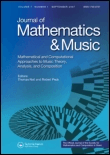
Journal of Mathematics and Music
Scope & Guideline
Charting New Territories in Mathematical Musicology.
Introduction
Aims and Scopes
- Mathematical Modeling in Music:
This area encompasses the use of mathematical frameworks to analyze and represent musical structures, including rhythms, harmonies, and tonal progressions. - Topological and Geometric Approaches:
The journal emphasizes topological and geometric methods to understand musical phenomena, including the study of spaces such as the Tonnetz and various geometrical representations of musical concepts. - Computational Music Analysis:
Research in this category involves the application of computational techniques, including algorithms and data analysis, to investigate musical patterns, styles, and structures. - Historical and Cultural Contexts:
The journal includes studies that contextualize mathematical music theory within historical and cultural frameworks, examining how different traditions influence mathematical interpretations of music. - Interdisciplinary Research:
A core aim is to promote interdisciplinary collaboration, bringing together mathematicians, musicologists, computer scientists, and other researchers to explore the intersections of their fields.
Trending and Emerging
- Quantum Approaches to Music:
There is a notable rise in research exploring quantum mechanics as it relates to music perception and composition, suggesting a growing interest in the intersection of physics and musical theory. - Topological Data Analysis:
The application of topological data analysis to various musical forms, including non-Western music, is gaining traction, reflecting a broader interest in utilizing advanced mathematical tools to explore music. - Machine Learning in Music Composition:
The integration of machine learning techniques for music composition and analysis is increasingly prevalent, indicating a trend towards computational creativity and automated musical processes. - Geometric and Non-Euclidean Musical Spaces:
Emerging studies focus on non-Euclidean geometries and their implications for understanding musical spaces, pointing to a novel direction in the mathematical representation of music. - Cultural and Ethnomusicological Perspectives:
Research that combines mathematical analysis with cultural and ethnomusicological contexts is gaining importance, highlighting the need for a holistic approach to music theory.
Declining or Waning
- Traditional Music Theory:
There appears to be a reduction in publications focusing on classical music theory concepts, as the journal shifts towards more innovative and interdisciplinary approaches. - Historical Music Analysis:
Studies deeply rooted in historical music analysis, particularly those that do not incorporate contemporary mathematical methods, have become less prominent, indicating a move towards modern analytical frameworks. - Basic Harmonic Structures:
Research centered on basic harmonic structures and simple chord progressions is less frequently addressed, as the journal's focus has expanded to more complex and abstract mathematical concepts.
Similar Journals

Music Theory Online
Unlocking Musical Insights: Where Theory Meets PracticeMusic Theory Online is a distinguished journal within the field of music, published by the Société for Music Theory. With an ISSN of 1067-3040, this open access journal has been providing valuable insights and scholarly contributions since 1993. Based in the United States, at the University of Chicago, Department of Music, it serves as a platform for rigorous research and discourse in music theory. The journal has achieved significant recognition, attaining a Q1 ranking within its category for 2023 and positioning itself at the 26th percentile among 180 journals in the Arts and Humanities, demonstrating its impact on the field. Facilitating access to cutting-edge studies, Music Theory Online aims to engage researchers, educators, and students by fostering a deeper understanding of music theory concepts and methodologies, thereby contributing to the advancement of musical scholarship.
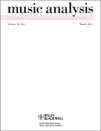
MUSIC ANALYSIS
Bridging Theory and Practice in Musical ResearchMUSIC ANALYSIS, published by WILEY, is a prestigious journal in the field of musicology, recognized for its critical contributions to the analysis of music and its myriad influences on culture and society. With an ISSN of 0262-5245 and an E-ISSN of 1468-2249, this journal has established itself as a vital resource for researchers, professionals, and students alike, boasting a Q1 ranking in the 2023 category of Music. As part of a highly competitive field, it ranks 70th out of 180 in the Arts and Humanities Music category on Scopus, positioning it within the 61st percentile. MUSIC ANALYSIS serves as an essential platform for innovative research and insightful discourse, engaging with musical theory, practice, and education from 1996 to 2024. Its commitment to fostering rigorous scholarship makes it indispensable for those seeking to deepen their understanding of music and its analytical frameworks. Although it does not offer Open Access options, its relevance and impact in the genre ensure accessibility through institutional subscriptions and university libraries.
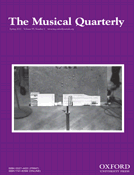
MUSICAL QUARTERLY
Fostering Insights in Music Theory and HistoryMUSICAL QUARTERLY, published by Oxford University Press Inc, is a distinguished journal in the field of music, with a publication history that stretches back to 1915. This esteemed journal, identifiable by its ISSN 0027-4631 and E-ISSN 1741-8399, provides a critical platform for scholarly discourse, analysis, and research in musicology and related disciplines, facilitating an understanding of both historical and contemporary musical practices. Although it operates without open access, it continues to attract a diverse readership of researchers, educators, and students alike, thanks to its well-curated articles and reviews that engage with music theory, history, and ethnomusicology. With a current Scopus rank of #119 out of 180 in the Arts and Humanities category and a 34th percentile ranking in Music, MUSICAL QUARTERLY plays a vital role in advancing knowledge and fostering collaboration within the music academic community. Its commitment to high-quality scholarship is reflected in its ongoing efforts to address the evolving landscape of music studies, making it an essential resource for anyone serious about exploring the rich tapestry of music scholarship.

Musicologica Brunensia
Connecting Passionate Minds Through Music ResearchMusicologica Brunensia, an esteemed journal published by Masaryk University, Faculty of Arts, serves as a significant platform for the dissemination of knowledge in the field of musicology. Based in the Czech Republic, this Open Access journal has been facilitating scholarly communication since 2009, allowing unrestricted access to its rich array of research articles. With an ISSN of 1212-0391 and an E-ISSN of 2336-436X, Musicologica Brunensia proudly holds a Q3 ranking in the Music category as of 2023, reflecting its dedication to advancing research in the arts and humanities, particularly music. The journal accepts contributions spanning diverse topics within music studies, fostering interdisciplinary dialogue among researchers, professionals, and students alike. Located at Arne Novaka 1, Brno, 60200, Czech Republic, Musicologica Brunensia is poised to continue its journey of promoting innovative scholarship in musicology until 2024 and beyond, making it a valuable resource for anyone passionate about the field.
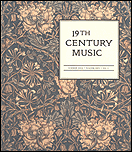
NINETEENTH CENTURY MUSIC
Documenting the Rhythms of Change in Music HistoryNineteenth Century Music is a prestigious journal published by University of California Press that has been a vital contributor to the understanding of musical trends and cultural contexts from the 19th century. With an ISSN of 0148-2076, this journal operates within the Q2 category in Music, ranking 96 out of 180 in the Arts and Humanities, reflecting its significant influence and recognition in the field. Established in 1977, it aims to explore diverse topics ranging from music theory to historical analysis, providing a comprehensive platform for researchers, professionals, and students interested in this rich period of music history. While currently not an open-access journal, it offers an array of subscription options that enhance access to its scholarly content. The journal continues to play a pivotal role in documenting and critiquing the myriad ways in which music intersected with the social and artistic movements of the 19th century, making it essential reading for anyone seeking to delve deeper into the subject.
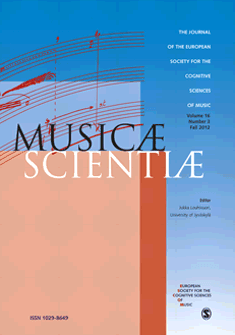
MUSICAE SCIENTIAE
Fostering Innovative Research at the Crossroads of Sound and ThoughtMUSICAE SCIENTIAE, published by SAGE Publications Ltd, is a prestigious interdisciplinary journal situated at the intersection of music and psychological studies. Established in 1997, this journal has garnered an impressive reputation, as evidenced by its 2023 Scopus rankings, where it ranks #2 in Music (Arts and Humanities) and #51 in Experimental and Cognitive Psychology. With a considerable impact factor and categorized in the Q1 and Q2 quartiles, it stands as a key resource for researchers, students, and professionals interested in the cognitive processes related to music engagement and its applications. Although it does not operate under an open access model, MUSICAE SCIENTIAE provides valuable insights and empirical studies that contribute to the ever-evolving understanding of music's impact on human behavior and cognition. By fostering a robust platform for scholarly dialogue, this journal continues to significantly influence research and practice within its fields.
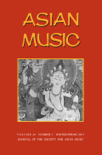
ASIAN MUSIC
Fostering Interdisciplinary Insights into Asian Music.ASIAN MUSIC is a distinguished academic journal published by University of Texas Press, focusing on the rich and diverse musical traditions of Asia. With an ISSN of 0044-9202 and an E-ISSN of 1553-5630, this journal serves as a key platform for interdisciplinary research that encompasses musicology, ethnomusicology, and cultural studies related to Asian music practices. While ASIAN MUSIC is not an open-access journal, it provides valuable insights and scholarly articles that contribute significantly to the understanding of music’s role within Asian cultures. The journal originally covered works from 2002 to 2010 and has a reputation for fostering discussions that celebrate the intricacies of sound, performance, and society. Targeting researchers, professionals, and students alike, ASIAN MUSIC stands as a crucial resource for those engaged in the study of music in its multifaceted context.
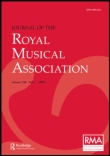
JOURNAL OF THE ROYAL MUSICAL ASSOCIATION
Bridging traditional and contemporary musicology.JOURNAL OF THE ROYAL MUSICAL ASSOCIATION, published by Cambridge University Press, stands as a significant repository for innovative research and scholarly discourse within the field of music studies. Recognized for its contributions to the understanding of musical practices, theory, and history, this esteemed journal offers a platform for academics and researchers to disseminate their findings to a broad audience. With an ISSN of 0269-0403 and E-ISSN of 1471-6933, the journal has maintained a notable presence since its inception, merging insights from both traditional and contemporary musicology. It currently occupies a Q4 ranking in Music within the Scopus database, reflecting its inclusion within the arts and humanities landscape. While the journal traditionally operates under subscription access, its continuing commitment to advancing music scholarship ensures that it remains an essential resource for students, scholars, and practitioners alike, fostering greater understanding and appreciation of musical artistry from 1987 to the current era.
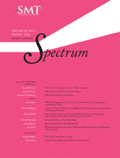
MUSIC THEORY SPECTRUM
Navigating the Complexities of Music TheoryMUSIC THEORY SPECTRUM, published by Oxford University Press, serves as a premier journal in the field of music theory, recognized for its significant contributions and scholarship since its inception. With an ISSN of 0195-6167 and E-ISSN 1533-8339, this journal has established a distinguished position within the academic community, boasting an impressive Q1 status in the Music category for 2023 and ranking #17 out of 180 in Scopus for Arts and Humanities, Music, placing it within the 90th percentile. Despite its non-open access format, MUSIC THEORY SPECTRUM offers a wealth of research articles, reviews, and theoretical discussions aimed at both seasoned scholars and students alike. It spans from 1981 until present, fostering critical engagement and advancing understanding within the discipline. Researchers and music theorists will find this journal an invaluable resource for the latest insights and methodologies in music theory.
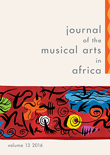
Journal of the Musical Arts in Africa
Unveiling the Richness of African SoundscapesThe Journal of the Musical Arts in Africa is a premier academic publication dedicated to exploring the rich and diverse musical traditions of the African continent. Published by ROUTLEDGE JOURNALS, TAYLOR & FRANCIS LTD, this journal offers a vital platform for researchers, professionals, and students in the field of musicology. With an ISSN of 1812-1004 and E-ISSN of 2070-626X, the journal has established itself as a significant contributor to the scholarly discourse surrounding African musical practices. With an impact factor reflecting its growing influence, the Journal of the Musical Arts in Africa is categorized in the Q3 quartile of music journals according to the latest metrics, placing it among an essential cadre of publications in the field. The journal invites original research articles, reviews, and critical essays that aim to expand the understanding of music as an integral part of African culture. It has been continuously publishing since 2004 and encompasses a wide range of topics, making it a must-read for anyone interested in the intersections of music, culture, and identity on the African continent. The journal stands as a testament to the vibrant musical heritage of Africa and encourages scholarly contributions that highlight the importance of music in reflecting and shaping societal values.